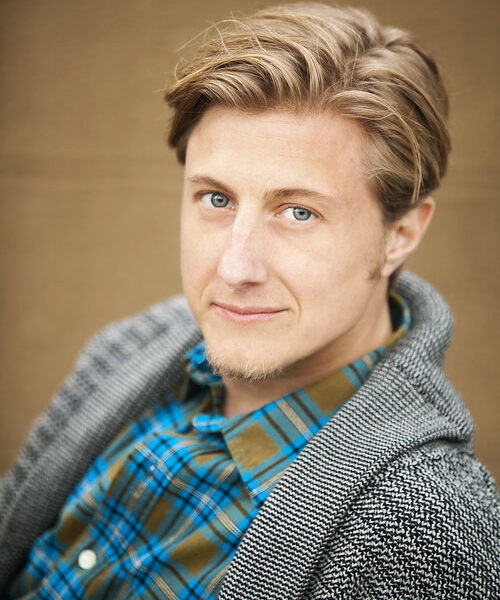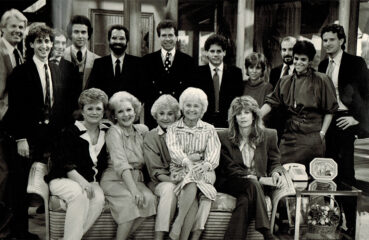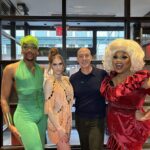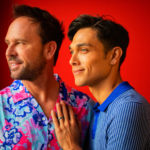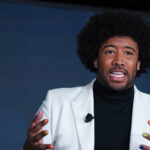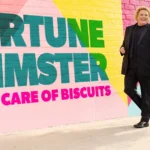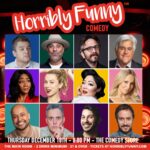My friendship with actor and activist Scott Schofield has been an interesting one. Everyone claims they want total honesty in a friendship, but it is brutal when it happens. There is no guessing game when it comes to Scott, he lays it out all out there regardless of what the consequences are. Truth is truth and he is not going to dance around it. That being said, no question is off topic. I learned more about the trans community from Scott in one long happy hour than I ever did in my years of sexuality studies or marching next to a trans person during Pride. There is no dumb question for Scott where the trans community is concerned: How do trans men have sex? Is “transgendered” a word? Why should the gay community include the T in LGBT? Go ahead, ask – you will get the answer from Scott’s point of view. What you find out is that being trans ultimately has nothing to do with sex, or pronouns, or surgeries – it is about being who you are.
Scott has made television history, not once, but twice. Five years ago, he became the first openly trans actor to play a major role in a soap opera, recurring in the role of Nick on The Bold and the Beautiful. This past season, Scott became the first transgender man nominated for any acting Emmy for his role on STUDIO CITY (Amazon Prime). You would think that making television history twice would secure high profile stardom, right? Not so.

Photo: Nicci B
It is not so much that I have to work hard for my roles—my ratio of auditions to roles is pretty high by any standard. When they see me, they like me. It is more about high-up decision-makers being willing to see me for more roles. If I only go out for trans masculine roles, that’s maybe three a year, max. That is the problem, right now.
So, first, I’m still waiting for Hollywood to see me as any character whose gender isn’t important to the role: an incisive therapist, an inspiring teacher, a trustworthy doctor or lawyer, and not just saint roles—I could be an asshole rich kid, a corrupt corporate businessman, a cop turned bad. After they see me for those roles, I will be waiting to be seen as the man I am—a funny, bright, handsome guy who could be a sweet boyfriend to an actor or actress.
But before any of that can happen, people who make decisions must not get so confused by the label put on me that they can’t even imagine how I’d play. I can wait. The good thing about becoming a man is people think you get better looking as you age.
Most actors, when asked about being nominated for a major acting award, will say it was an honor just to be nominated. This is true for Scott. This year’s awards season was dampened by COVID, so the networking opportunities at the awards parties, star and agent meetings, and red-carpet interviews just did not happen. But Scott used the whirlwind of the digital press to get his message out.
The goal was not to win, it was to learn everything I could to “Robin Hood” the experience, so I can help future actors win.
I got a very clear message that it is not about me. Achieving another historical breakthrough—becoming the first trans man nominated for any acting Emmy, Daytime or Primetime—is about where the world is right now, and it is about spotlighting my community. So, I spent most of that time interviewing other trans guys in entertainment for my IGTV, and doing as much press as possible, talking about trans masculine folks, to make guys like me more visible.
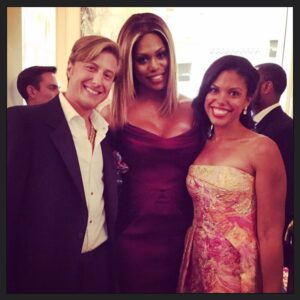 During one of our very candid conversations, we chatted about the trans male versus female celebrity popularity in the media. We love to see Laverne Cox work the red carpet in her gowns, we love Alexandra Billing’s strong performances in her television appearances, Pose’s Dominque Jackson’s one-liners are oft-repeated and her Pose co-star Indya Moore is making a splash as a model as well as an actress – I, in my naivete, have not been able to ramble off names of male trans actors.
During one of our very candid conversations, we chatted about the trans male versus female celebrity popularity in the media. We love to see Laverne Cox work the red carpet in her gowns, we love Alexandra Billing’s strong performances in her television appearances, Pose’s Dominque Jackson’s one-liners are oft-repeated and her Pose co-star Indya Moore is making a splash as a model as well as an actress – I, in my naivete, have not been able to ramble off names of male trans actors.
There’s obviously more trans women who are visible than trans men—I think GLAAD counted it at like three trans women for every trans man on screens. The question of “why?” is less interesting to me than “how do we even it out?”
Two to three trans women are murdered every single month in the US because the people who murder them do not consider them even human, and even more people consider them somehow dangerous. Trans women need authentic visibility to show their humanity, to raise awareness of the epidemic of violence against them. And 50% of trans guys attempt suicide—it is a self-directed violence that comes from having nothing positive to see about ourselves in the world. We need both kinds of stories, and we need a lot more stories about trans men, stat.
There has been a marked increase in the visibility of trans characters in entertainment. Well, to be clear, an increase in trans roles that are a regular part of the storyline, not some tragic murder victim on Law and Order: SVU. The Chilling Adventures of Sabrina, Supergirl, The Good Doctor, Good Girls, Grey’s Anatomy are just a few titles with recurring characters that are included in seamless storylines as part of the full narrative, not a highlight for spectacle. The roles being offered though, from Scott’s personal experience, are still lagging.
To be honest, things have not really changed, yet. Storytelling about trans men just has not progressed much in five years. And there are so many trans men with pilots and series that are good! Hollywood is missing out.
Getting work as a trans actor is not just dependent on a better understanding by Hollywood producers, it is also dependent on a clear understanding by agents and managers as to what the goal of a trans actor is.
I have been recently blessed with representation whose goal is to get me roles with zero fanfare. It’s funny how that’s the goal: for me to get roles, and for that to be unremarkable. They see how the trans label is not actually affixed to my talent or my potential. And they are doing a lot of educating out in casting land, so that decision-makers will see that, too.
I have been present for Scott’s ups and downs, both personally and in the entertainment biz. I was there when he met his wife for the first time, I have swapped stories with his parents, I have heard about the auditions that went well, I have heard about the auditions that did not go well, I have heard about the successful workshops, the canceled productions, and the uphill battle to produce his own film, Becoming A Man in 127 Easy Steps.
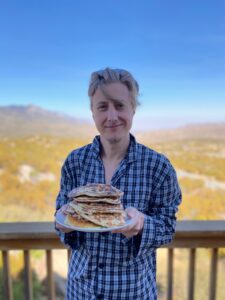
Photo: Nicci B
The original, live version of Becoming A Man in 127 Easy Steps is one of the three one-man shows that have toured major venues in the US and Europe, with the support of the National Performance Network and the Princess Grace Foundation-USA. Becoming a Man in 127 EASY Steps was 20 years in the making generating 127 pieces of short content that deeply explore the gender-universal and particularly-trans themes of childhood, parenthood, love, sex, death, survival, and authenticity. With over $125,000 raised from past audiences, the film finally came to be and was released as a festival hit this last summer. Scott’s dream of seeing his film on the big screen was still not to be, COVID stopped the festivals from premiering the film in theaters in front of an audience and had to opt for the quarantine-friendly online route.
We had excellent successes at Tribeca and Outfest, in different ways. We got great reviews; we made a strong relationship with a distributor and some other excellent Industry folks who want to take us to new and exciting places. The next step is getting it out into the world, which is its own journey! The festivals were just the beginning.
And just what were Scott’s easiest and hardest steps in becoming a man?
The hardest step, for me, was just beginning. I was so conditioned by culture to believe that there was something wrong with me—when it’s so much more logical and life-affirming to just accept that diversity is a part of gender, the way it’s a part of everything else. After accepting myself as the man I know I am, every other step in life has been much easier. I can meet even the most difficult situations with so much more ease because I know who I am.
Scott has literally traveled the world performing. He has lived in Alaska, France, Georgia, and more to create and curate art. Living within a variety of regions has given him perspective as to how trans culture is received on an international level as compared to the US.
Every culture has its own idea of what gender is, and how people should do it. So, when I show up, I bring something uniquely my own—but also an outlook that is very American. For example, in France, my show was a runaway hit—we extended 9 shows. I learned that they loved the honesty and openness I delivered because people aspire to that sort of authenticity there, but tradition is so intense that it is still rare. I loved performing in Ireland because it is a nation of storytellers from way back—I could tell that they appreciated how I told each step.
But really, every city in the US is foreign to any other. I performed for 800 people in Miami like it was just any other show in all the live performance that Miami supports; I got censored in Tampa as if I was committing a crime against humanity just for having a body.
Most recently, Scott can be seen in HBO Max’s docuseries, Equal, alongside a who’s who of LGBTQ actors telling the stories of forgotten LGBTQ heroes from the past. Scott plays Craig Rodwell, one of the leading gay rights activists for the gay movement in the ‘60s.
I was directly impacted by Craig Rodwell’s life. He started the Oscar Wilde Memorial Bookshop in New York City—as well as being one of the founders of the Pride Parade as a tradition after Stonewall. I went to New York for an internship, and my first stop was to that bookshop, looking for a part-time job. They weren’t hiring, but the bisexual behind the counter organized lesbian parties at Meow Mix, and she hired me to pass out postcards for the events. Consequently, I got into those events, even though I was underage and that’s where I met the first guy I knew to be trans. That interaction was my light-bulb moment and gave me the one example I needed to become who I really am. All thanks to Craig Rodwell and the center he made for our community with the Oscar Wilde Memorial Bookshop.
A trans man playing a gay man for HBO, we have come a long way.
I was finally acting at the level my experience has prepared me for, having been cast for my skill, and how my look fit the role. You know, like actors who are not trans get to do all the time.
Behind the camera, Scott consults for HBO’s Euphoria; the role he helped create has been called “TV’s most interesting trans character” and “the future of TV.” The fact that productions are now calling in LGBTQ consultants to “get it right” must mean we are heading in the right direction, right?
Finally, Hollywood is listening to people in the communities it is representing. It is hiring not only actors but also writers, directors, and producers who live lives like the stories being told. It is the only way to get real authenticity, and it has made for much better work. Now I just want them to get past the labels—don’t stop doing authenticity, but let us really play, not just play ourselves. When we get to that point—where actors who have been marginalized can play anything, to me, that will be a sign of real equality, and after that, maybe we really could all just be actors.
I always look to Scott for a logical response to social and political situations and will often send him a frantic text when I’m in a situation that needs an educated insight. The biggest difference in our personalities (besides my love of vodka) is that I fly off the handle and will stick to my grudges and instinctive responses. Scott will step back, look at the facts, take a breath, and approach the situation. This last year has been full of unrest and our friends, our neighbors, and our families have shown their true colors when it comes to politics and the LGBTQ community. Is cancel culture ok?
The problem I have with cancel culture is that it leaves no room for change, for redemption. Without change and redemption, there are no good stories in Hollywood. But then you have people who refuse to change, who hold back the work of change—what do you do with those folks?
I got into this recently with that Harry Potter author. She is doing real harm to the trans community, and I channeled my rage into speaking out about it. I am an expert, and I can stand my own ground in that fight. I educated, I wrote viral tweets, I got quoted about it in People. It did not make any difference, and all I ended up doing was amplifying her name (which, BTW, is pronounced JoKaren), and feeling all that anger. That will give you cancer.
Laverne Cox helped me see the forest for the trees. She encouraged me to focus on the issues over the people, to choose having class over engaging in feuds. Our conversation helped me remember where I come from—I grew up in the South, and if I had tried to cancel everybody who deserved it, I would have gotten nowhere. So, I went back to doing what I did to survive in the South. Now I look for the helpers, I dive in with the change-makers, I do not waste energy on people caught up in retrograde ideologies. I don’t even think about them, much less take time to cancel them, and if I do find them on my mind, I focus it on hope—that they experience a transgender level of change.
Whenever I get to see Scott speak or perform, I am always taken aback by the pensive silence from his audiences. They are captivated. Whether they are gay, straight, trans, or something in between, he is speaking about being our authentic self, something we all live our lives trying to figure it out. Scott has a few easy steps ahead of us.
Writer’s Note: In reference to my first paragraph, Scott gently informed me that “transgendered” is not a word, although it has been used in regular conversation. You never say “gayed”, and so you shouldn’t say “transgendered” – you don’t stop being gay, you don’t stop being trans; as Scott puts it, we are always in the present…then he told me to knock that shit off and stop saying it.
Photo: Olivia Hemaratanatorn
Last modified: December 23, 2020

